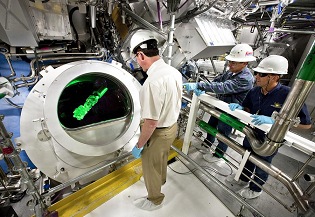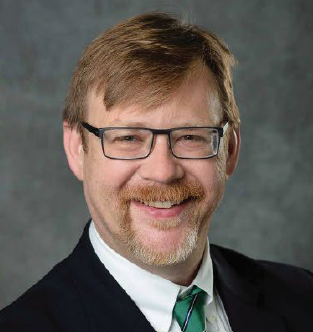Moving to Address the Curse of Dimensionality to Enable ‘First Principle’ Optimal Design in Fusion Systems
Enable ‘First Principle’ Optimal Design in Fusion Systems

The seminar will be web-simulcast via Zoom:
https://umich.zoom.us/j/91810335233
Passcode: MIPSE
Recent advances at the National Ignition Facility (NIF) and their achievement of thermal nuclear burn represents an exciting advancement in fusion energy systems. A close synergy between simulation, theory, and experiment, (including data assimilation) led to this advance. However, if we were to design a new device at a new operating point outside parameters covered by the experiments, we lack the ‘first principle’ predictive capabilities that enable such a design. This is because inertial and magnetically confined fusion systems are far from an equilibrium state and can span many plasma regimes Behind all of these challenges in building ‘first principle’ models is dimensionality.
To address this challenge, the Center for Hierarchical and Robust Modeling of Non-Equilibrium Transport (CHaRMNET) was created. CHaRMNET, a DoE Mathematical Multifaceted Integrated Capability Center, will develop mathematical tools that enable ‘first principle’ effects within the design loop of fusion energy systems. CHaRMNET will exploit structure within models to mitigate the challenges of dimensionality and to bridge wide ranges of length and time scales in plasma science. The challenge of dimensionality is pervasive throughout computational science and refers to the observation that the resources to solve a problem on a computer scale exponentially with the dimensions. Fundamental plasma models are 7-dimensional and are presently computationally intractable for the engineering scale of plasma systems. In this talk, I will give an overview of the various thrusts in CHaRMNET to address this challenge, with a focus on Multi-Scale Modeling.
Date and Time
Location
Hosts
Registration
-
 Add Event to Calendar
Add Event to Calendar
Loading virtual attendance info...
- 2121 Bonisteel Blvd
- University of Michigan
- Ann Arbor, Michigan
- United States 48109
- Building: Chrysler Center
- Room Number: 133
Speakers
 Dr. Andrew Christlieb of Michigan State University - Computational Mathematics, Science and Engineering
Dr. Andrew Christlieb of Michigan State University - Computational Mathematics, Science and Engineering
Moving to Address the Curse of Dimensionality to Enable ‘First Principle’ Optimal Design in Fusion System
Recent advances at the National Ignition Facility (NIF) and their achievement of thermal nuclear burn represents an exciting advancement in fusion energy systems. A close synergy between simulation, theory, and experiment, (including data assimilation) led to this advance. However, if we were to design a new device at a new operating point outside parameters covered by the experiments, we lack the ‘first principle’ predictive capabilities that enable such a design. This is because inertial and magnetically confined fusion systems are far from an equilibrium state and can span many plasma regimes Behind all of these challenges in building ‘first principle’ models is dimensionality.
To address this challenge, the Center for Hierarchical and Robust Modeling of Non-Equilibrium Transport (CHaRMNET) was created. CHaRMNET, a DoE Mathematical Multifaceted Integrated Capability Center, will develop mathematical tools that enable ‘first principle’ effects within the design loop of fusion energy systems. CHaRMNET will exploit structure within models to mitigate the challenges of dimensionality and to bridge wide ranges of length and time scales in plasma science. The challenge of dimensionality is pervasive throughout computational science and refers to the observation that the resources to solve a problem on a computer scale exponentially with the dimensions. Fundamental plasma models are 7-dimensional and are presently computationally intractable for the engineering scale of plasma systems. In this talk, I will give an overview of the various thrusts in CHaRMNET to address this challenge, with a focus on Multi-Scale Modeling.
Biography:
Andrew Christlieb is a University Foundation Professor of Mathematics at Michigan State University. He is the lead PI and Director of the Center for Hierarchical and Robust Modeling of Non-Equilibrium Transport. He also serves as the PI for an NSF-HDR-CORE joint program with Spel-man College on increasing pathways for marginalized groups within data science as well as the MSU PI on a joint Sloan grant with Spelman on increasing capability for education experiences in data science at institutions serving historically marginalized groups. Prior to serving in these roles, he was the founding chair for the Dept. of Computational Mathematics, Science and Engineering from 2015-2021. Currently, CMSE is 32 faculty, approximately 100 graduate students, 20 post docs and 250 data science undergraduates. During his tenure as chair, junior faculty in CMSE received 14 career awards over 4 years. Christlieb was an Air Force Young Investigator, served as an IPA with Kirtland Air Force base and served and a range of roles at MSU since moving there in 2006 as an Assistant Professor.
Agenda
3:30 pm Introduction
3;35 pm Start of talk
4:30 pm event ends
ALL times are in EST/EDT
An IEEE Southeastern Michigan Section event. All are welcome. Consider becoming an IEEE member if such similar events are of professional/academic interest to you
Media
| Christlieb_flyer23_v03 | 199.32 KiB |

